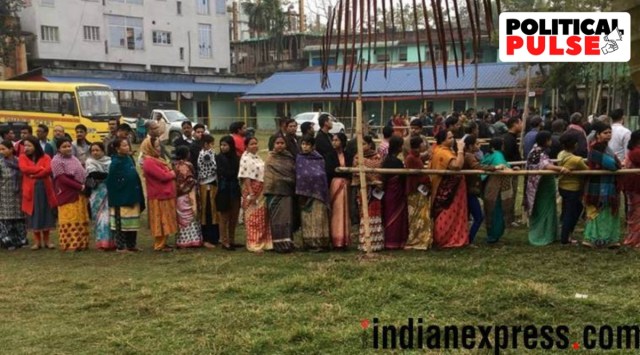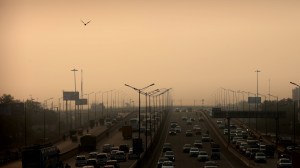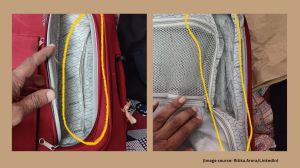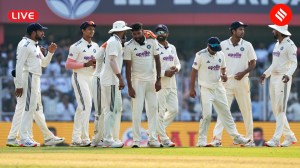As polls announced, Naga group sticks by call for boycott over separate state
Proposed 'Frontier Nagaland' comprises six eastern districts covering 20 of the 60 Assembly seats that have remained politically and administratively neglected for decades
 Regional disparity between the eastern Nagaland districts — which make up more than 30 per cent of the population of the state — and the rest of the state, is a commonly recognised fact. The 2016 Nagaland State Human Development Report spelt this out. (Representational image)
Regional disparity between the eastern Nagaland districts — which make up more than 30 per cent of the population of the state — and the rest of the state, is a commonly recognised fact. The 2016 Nagaland State Human Development Report spelt this out. (Representational image) The schedule for Assembly polls in Nagaland has been issued in the backdrop of a still-standing call for boycott of the polls by bodies pushing for the carving out of a new state of Frontier Nagaland.
In August 2022, the influential Eastern Nagaland People’s Organisation (ENPO) passed a resolution to abstain from participating in the 2023 Assembly polls, unless the demand for the formation of a separate state — comprising the six eastern Nagaland districts of Kiphire, Longleng, Mon, Noklak, Shamator and Tuensang — is met. These districts account for 20 of the 60 seats in the Assembly, and are inhabited by members of seven tribes: Konyak, Khiamniungan, Chang, Sangtam, Tikhir, Phom and Yimkhiung.
On Wednesday, the same day as the ECI released the election schedule, the Konyak Union — one of the constituents of the ENPO — conducted an emergency meeting and resolved to “remain steadfast” with the ENPO’s August 2022 resolution.
It also resolved to “permanently expel those individual(s) filing nomination to participate in the NLA election 2023 from Konyak soil and the village of the person shall be held solely responsible”.
The ENPO, which has been in talks with the Ministry of Home Affairs over its demand, has not commented since the election announcement, but an ENPO member said that while the election process “can take place”, the organisation does not intend to participate till its demands are met.
The creation of a separate state comprising the eastern districts of Nagaland — a long-standing and popular demand — escalated over a decade ago, when the ENPO submitted a memorandum to the Prime Minister’s Office in November 2010, demanding a separate state with special status and provisions, owing to a “development deficit” in that region. That lack of development in the region has continued to be the driving force behind the demand for a separate state.
Regional disparity between the eastern Nagaland districts — which make up more than 30 per cent of the population of the state — and the rest of the state, is a commonly recognised fact. The 2016 Nagaland State Human Development Report spelt this out.
While remarking on the overall rise in the three Human Development Indices — Income and Livelihood, Gender Issues and Poverty Alleviation — the report notes that “there is considerable intra-state disparity in the spread of the benefits of development”.
“Here, the major contrast is between the eastern districts of Kiphire, Longleng, Tuensang and Mon, and those centred around Kohima and Dimapur. Tuensang (from which the new district of Kiphire and Longleng were carved out in 2008) and Mon remain at the bottom in terms of all three indices, a picture that has not changed since 2004. In fact, the gap between these districts and the rest has been widening over time,” states the report.
It notes that while the state’s average literacy rate is about 80 per cent, it is as low as 56.99 per cent in Mon; that worker participation rates in Mon and Tuensang are the lowest in the state; and that agriculture in this overwhelmingly rural region has largely remained subsistence.
“You just need to see the region to understand the situation. We have been politically and administratively neglected for decades. Ever since we have been a part of Nagaland, we have been economically and educationally far behind all other Nagas… When years of bureaucratic discussions, bilateral and tripartite talks did not yield anything concrete, we had to do something to attract the attention of the central government, which is why we decided to abstain from the upcoming elections. After that, there was a meeting with the Home Minister, following which a team was set up at the Home Ministry-level, and negotiations started,” said Hawang T. Wangsha, former Secretary-General of the ENPO and a former president of the Eastern Naga Students’ Federation.
Historically, the lack of administrative governance in the region is a major factor in the disparity. In fact, the first time elections to the state legislative Assembly was held in these districts was only in 1974. The area of the present-day districts was outside the umbrella of the British colonial administration, and after being under the Tuensang Frontier Division of the North East Frontier Agency (NEFA) in the early 1950s, it became an administrative unit called the Naga Hills Tuensang Area in 1957. When the state of Nagaland was created in 1963, the region was placed in special charge of the Governor for 10 years because of its “backwardness”, and remained under a regional council without representation in the Assembly.
While negotiations continue, the Nagaland Cabinet earlier this month appealed to the ENPO to reconsider its demand for a separate state and its boycott call “in the greater interest of the Naga people”. This week, Chief Minister Neiphiu Rio said, “Discussion is going on and it’s quite positive. Any outcome will be positive.” One thing the ENPO and the tribal unions are sure about is that without their cooperation, the state’s electoral process won’t be successful.




- 01
- 02
- 03
- 04
- 05



























